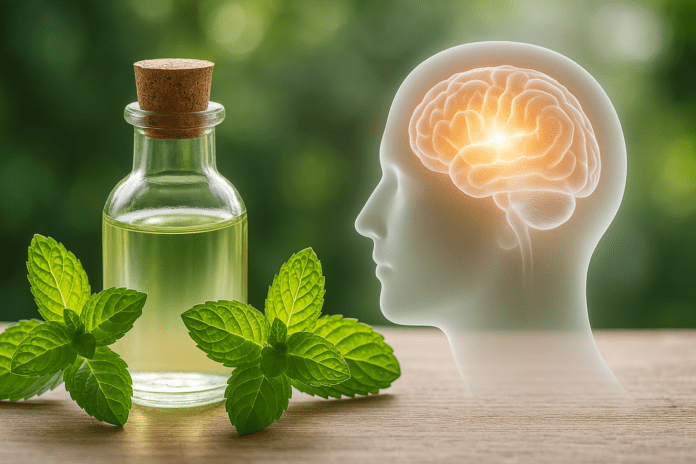In an age of constant distraction, cognitive fatigue, and mounting mental stress, many individuals are exploring natural remedies to support their mental performance and long-term brain health. One of the most talked-about solutions in recent years is the use of essential oils, especially peppermint oil, for enhancing focus and reducing mental cloudiness. But how much of this popularity is rooted in science, and what can we realistically expect from using peppermint oil for brain function?
You may also like: How to Improve Focus and Concentration: Proven Techniques for Boosting Mental Clarity and Productivity
Emerging evidence suggests that certain essential oils, including peppermint oil, may influence neurotransmitter activity, promote wakefulness, and even support cognitive resilience. While aromatherapy has been practiced for centuries, modern clinical research is beginning to unravel the biochemical mechanisms behind its effects. In this comprehensive article, we will examine the current scientific landscape surrounding peppermint oil brain fog relief, its potential role in improving concentration, and the broader implications of essential oils for brain fog and cognitive clarity.
Understanding Brain Fog: More Than Just a Fuzzy Feeling
Brain fog is not a medical diagnosis, but it is a widely reported phenomenon that encompasses symptoms such as forgetfulness, mental fatigue, poor concentration, and slowed thinking. People experiencing brain fog often describe feeling as though a mental haze is obstructing their ability to think clearly or stay focused. These symptoms can be caused by a variety of factors including sleep disturbances, hormonal imbalances, chronic stress, poor nutrition, and inflammatory conditions.
Neuroscientific research has identified that cognitive fog is often linked to disruptions in neurotransmitter balance and increased neuroinflammation. These disruptions can interfere with synaptic plasticity, the brain’s ability to adapt and process information efficiently. Inflammation within the brain can also impair blood flow and oxygen delivery, leading to decreased energy production at the cellular level. For individuals seeking natural strategies to alleviate these symptoms, the question arises: does peppermint help you focus, and if so, how?
The Cognitive Chemistry of Peppermint Oil
Peppermint oil is derived from the Mentha piperita plant, a hybrid of watermint and spearmint. It contains a variety of active compounds, including menthol, menthone, and cineole, which are known to influence neurological function. Menthol, the primary compound in peppermint oil, has demonstrated the ability to interact with the GABAergic and serotonergic systems in the brain—systems heavily involved in mood regulation, attention, and cognitive performance.
Studies suggest that peppermint oil can stimulate the reticular activating system, a network in the brainstem responsible for regulating wakefulness and attention. This stimulation may partly explain why peppermint oil for concentration has become a popular recommendation in the world of natural remedies. The invigorating scent of menthol has also been shown to activate cold-sensitive receptors in the nasal passage, which can trigger an alerting response in the brain. This response may help reduce the sluggishness commonly associated with brain fog.
Clinical Evidence Supporting Peppermint Oil for Concentration
Though more extensive research is still needed, several small-scale clinical trials and laboratory studies have indicated that peppermint oil may positively influence cognitive performance. In a study published in the International Journal of Neuroscience, participants exposed to the aroma of peppermint essential oil reported significantly higher alertness and memory performance compared to those exposed to a placebo. Functional brain imaging also suggested heightened activity in areas associated with attention and working memory.
Another double-blind, placebo-controlled trial conducted at Northumbria University in the UK found that individuals who consumed peppermint oil capsules demonstrated enhanced long-term memory and increased processing speed. While the precise mechanisms are still being explored, these findings lend credence to the claim that peppermint oil for concentration may have legitimate scientific backing.

Mechanisms Behind Peppermint Oil Brain Fog Relief
The ability of peppermint oil to alleviate symptoms of brain fog may stem from its anti-inflammatory and vasodilatory properties. Chronic low-grade inflammation has been implicated in cognitive decline and reduced mental clarity, especially among individuals with autoimmune or neurodegenerative conditions. Peppermint oil contains compounds that inhibit pro-inflammatory cytokines, helping to protect neural tissues from oxidative stress and inflammation.
Additionally, peppermint oil promotes vasodilation, which can increase cerebral blood flow. Enhanced blood flow supports better delivery of oxygen and nutrients to brain cells, facilitating improved mental energy and cognitive function. This aligns with anecdotal reports of individuals feeling more mentally “awake” or “clear-headed” after inhaling or topically applying peppermint oil.
Using Essential Oils for Brain Fog: Practical Approaches
While peppermint oil is the most widely studied essential oil for cognitive enhancement, it is not the only one. Other essential oils for brain fog include rosemary, eucalyptus, lemon, and frankincense, each offering unique neurochemical properties. However, peppermint stands out due to its immediate stimulating effects and strong aromatic profile.
For those interested in using peppermint oil to combat brain fog, methods of application are important. Inhalation through a diffuser or direct palm inhalation is one of the fastest ways to experience cognitive benefits, as aromatic molecules travel directly to the brain via the olfactory bulb. Topical application, such as dabbing diluted oil on the temples or the back of the neck, can also be effective, especially when paired with massage to promote circulation.
Peppermint oil capsules offer another delivery system, although oral supplementation should be approached cautiously and ideally under the supervision of a healthcare provider. High concentrations can irritate the gastrointestinal tract or interact with medications. Regardless of the method used, consistency is key for those hoping to experience ongoing relief from brain fog and improved concentration.
Does Peppermint Help You Focus During Mentally Demanding Tasks?
A common question among students and professionals alike is whether peppermint oil can support focus during periods of intense mental effort. The available evidence suggests that yes, peppermint oil may indeed help with sustained attention and mental endurance. In environments that require prolonged cognitive engagement—such as test-taking, data analysis, or creative problem-solving—the stimulating properties of peppermint oil may provide a non-pharmaceutical edge.
The alerting effects of peppermint oil may also be particularly valuable for individuals with ADHD or mild cognitive impairment, although more research is needed to draw firm conclusions in these populations. One hypothesis is that peppermint oil enhances dopaminergic activity, contributing to greater motivation and mental stamina. While it should not replace evidence-based treatments, it can be a helpful adjunct for those seeking additional cognitive support.
Synergistic Use of Essential Oils for Brain Fog and Mood Regulation
Mental clarity does not exist in a vacuum; it is deeply connected to emotional well-being. Stress, anxiety, and mood disorders are among the top contributors to cognitive fog. In this context, combining peppermint oil with calming essential oils such as lavender or bergamot may provide a more balanced therapeutic effect. This dual approach targets both the excitatory and inhibitory aspects of the nervous system, supporting not just mental sharpness but emotional regulation as well.
Research shows that when used together, certain essential oils for brain fog can create synergistic effects, amplifying each other’s benefits. For example, peppermint may provide the cognitive lift, while lavender helps reduce the mental clutter caused by stress or overthinking. This type of synergy is especially useful for individuals experiencing stress-induced cognitive fatigue.
Longevity Implications: Cognitive Preservation and Anti-Aging
While the immediate effects of peppermint oil on concentration are noteworthy, its potential role in long-term cognitive preservation is equally compelling. Chronic inflammation and oxidative stress are two major contributors to age-related cognitive decline. By modulating inflammatory pathways and supporting mitochondrial function, peppermint oil may offer neuroprotective benefits over time.
Although the current evidence does not support peppermint oil as a standalone intervention for neurodegenerative conditions, its antioxidant properties could complement broader anti-aging strategies. Lifestyle interventions that include proper nutrition, physical activity, sleep hygiene, and cognitive stimulation can be enhanced by incorporating essential oils into a holistic routine. For aging adults concerned with maintaining mental sharpness, exploring peppermint oil brain fog solutions may offer a valuable addition to their wellness toolkit.
Safety Considerations and Contraindications
While peppermint oil is generally regarded as safe when used appropriately, there are important precautions to consider. Essential oils are highly concentrated and can cause skin irritation or allergic reactions if not properly diluted. It is advisable to conduct a patch test before widespread topical use and to consult a healthcare provider before starting any new supplementation, particularly for individuals who are pregnant, breastfeeding, or taking prescription medications.
Some individuals may also be sensitive to strong scents, and in rare cases, peppermint oil can trigger headaches or exacerbate respiratory issues. Children under the age of six should avoid direct application or inhalation due to the potential risk of respiratory distress. Awareness of these factors is essential to using peppermint oil safely and effectively as part of a cognitive enhancement strategy.
Bridging Traditional Practices and Modern Neuroscience
The growing interest in natural health solutions has brought renewed attention to the therapeutic potential of aromatherapy. Historically, peppermint oil has been used in traditional medicine for ailments ranging from digestive issues to headaches. Modern neuroscience is now beginning to validate some of these uses, particularly in the realm of mental clarity and focus.
As our understanding of neurobiology deepens, it becomes increasingly clear that natural interventions can interact with brain chemistry in meaningful ways. While peppermint oil is not a cure-all, it exemplifies how traditional remedies can be integrated into evidence-informed approaches to brain health. The convergence of ancient knowledge and contemporary science opens exciting possibilities for those seeking gentle, yet effective, tools for cognitive support.
Optimizing Your Routine: Integrating Peppermint Oil Mindfully
Successfully incorporating peppermint oil into your daily routine requires intentionality. Consider starting with a morning ritual that includes peppermint oil diffusion while planning your day or performing mentally demanding tasks. For those who prefer tactile engagement, gently massaging diluted peppermint oil onto pressure points before work or study sessions can serve as both a grounding and energizing practice.
Incorporating essential oils into mindfulness exercises, such as deep breathing or meditation, can further enhance their effects. The scent of peppermint can serve as a sensory anchor, helping to reduce mental wandering and increase focus. By pairing aromatic stimulation with mental discipline, users may cultivate a more resilient and adaptable cognitive state over time.

Reflecting on the Evidence: Does Peppermint Oil Really Work?
When weighing the benefits of peppermint oil brain fog relief or its role in enhancing concentration, it is important to consider the evidence alongside personal experience. While not a replacement for medical interventions when needed, peppermint oil offers a safe, accessible, and potentially effective option for supporting mental clarity. As with many natural remedies, outcomes may vary based on individual biochemistry, application method, and consistency of use.
What is clear is that peppermint oil holds promise as part of a comprehensive approach to cognitive health. It bridges the gap between natural wellness practices and scientifically supported strategies, making it a valuable consideration for those seeking to enhance focus, reduce mental fatigue, and support long-term brain vitality.
Frequently Asked Questions: Peppermint Oil for Brain Fog and Concentration
1. Can peppermint oil be used as a long-term cognitive support strategy?
Yes, peppermint oil can be part of a long-term cognitive support regimen, especially when combined with lifestyle practices that promote brain health. While short-term use of peppermint oil for concentration is well-documented in terms of alertness and temporary focus, some research suggests its anti-inflammatory and antioxidant properties may also support neural resilience over time. For individuals managing chronic stress or early cognitive fatigue, consistent use of peppermint oil—particularly through aromatherapy—could serve as a gentle adjunct to more comprehensive interventions. It’s essential to rotate essential oils for brain fog occasionally to prevent sensory desensitization, which can diminish their effectiveness. Integrating peppermint oil brain fog strategies with proper nutrition, sleep hygiene, and cognitive training may yield more sustainable cognitive benefits.
2. What’s the best time of day to use peppermint oil for mental clarity?
The best time to use peppermint oil for concentration tends to be in the morning or early afternoon, when the body and brain are naturally primed for productivity. Inhaling peppermint oil during these windows may enhance alertness without the jittery side effects associated with caffeine. For people who experience afternoon energy slumps or “brain fog crashes,” reintroducing peppermint oil via diffusion or direct inhalation can be particularly revitalizing. It’s worth noting that using peppermint oil too close to bedtime may disrupt relaxation or interfere with winding down, as its stimulating effects could delay sleep onset. Thus, when considering essential oils for brain fog, timing and circadian sensitivity should play a role in optimizing results.
3. Are there ways to enhance the effects of peppermint oil through complementary techniques?
Absolutely. Pairing peppermint oil with specific cognitive exercises or mindfulness practices can amplify its benefits. For example, practicing focused breathwork or meditation immediately after inhaling peppermint oil may heighten mental clarity by reinforcing neural engagement. Similarly, using peppermint oil before a focused writing or problem-solving session can prime the brain for improved task performance. Some users report that coupling peppermint oil with physical movement—such as yoga or stretching—helps clear lingering brain fog and promotes circulation to the brain. When evaluating whether peppermint oil brain fog relief is right for you, consider it as part of a multimodal toolkit rather than a stand-alone solution.
4. Does peppermint help you focus better than other essential oils?
Among essential oils for brain fog, peppermint is widely recognized for its energizing and clarifying properties. While oils like rosemary and lemon also promote cognitive alertness, peppermint’s high menthol content creates a sensory “wake-up” effect that many users find immediately effective. That said, focus is subjective and context-dependent—some individuals may respond better to other oils depending on their neurological baseline, stress levels, and even scent preferences. The question “does peppermint help you focus” must be approached with nuance, as response can vary from person to person. Exploring essential oil combinations may help uncover personalized focus-enhancing blends that outperform any single oil.
5. Can peppermint oil improve digital focus during screen-heavy workdays?
Yes, peppermint oil can be a useful tool for maintaining focus during prolonged screen exposure. Digital fatigue often manifests as cognitive dullness, blurred focus, and even tension headaches, which peppermint oil may help alleviate. By stimulating sensory pathways, peppermint oil for concentration may counteract the mental fatigue associated with constant online multitasking. For remote workers and students, diffusing peppermint oil in a home workspace or applying it to pressure points like the temples or wrists can provide a mid-day cognitive boost. This application of peppermint oil brain fog relief is particularly relevant in today’s increasingly digital world.
6. How do emotional states affect the effectiveness of peppermint oil for focus?
Emotions play a significant role in cognitive performance, and peppermint oil may indirectly improve focus by modulating mood. Chronic stress, anxiety, and emotional overwhelm can cloud cognition, making it harder to concentrate. Peppermint oil’s stimulating properties may help shift emotional states from lethargy to alertness, which can then enhance mental clarity. When combined with grounding or calming oils, like frankincense or cedarwood, peppermint oil can provide a balanced emotional and cognitive uplift. Thus, in answering whether peppermint helps you focus, it’s important to consider its mood-enhancing effects as part of the broader equation.
7. Are there innovative technologies or products that enhance peppermint oil delivery?
Yes, technological advances in aromatherapy delivery systems have made peppermint oil more versatile and user-friendly. Wearable diffusers, nasal inhalers, and essential oil-infused jewelry allow for discreet and sustained exposure throughout the day. These innovations are particularly helpful for those using peppermint oil for concentration in shared or professional environments where traditional diffusers may not be feasible. Additionally, some cognitive wellness apps now include guided focus sessions that incorporate aromatherapy cues, blending digital tools with natural compounds like peppermint. As the market for essential oils for brain fog continues to grow, we can expect more targeted delivery systems tailored to cognitive performance.
8. Is there a psychological component to peppermint oil’s effectiveness?
Yes, the brain’s associative memory system plays a key role in how we respond to peppermint oil. When used consistently in conjunction with focused mental tasks, the scent of peppermint may become a cognitive trigger, signaling the brain to enter a “flow state.” This psychological anchoring can be especially useful for students, writers, or professionals who thrive on routines. Over time, using peppermint oil for concentration may condition the mind to associate its aroma with peak productivity. So, while the question “does peppermint help you focus” can be answered physiologically, there is also a strong behavioral and psychological component to consider.
9. Can peppermint oil support mental clarity during hormonal fluctuations or menopause?
Peppermint oil may offer specific benefits for individuals experiencing hormonal shifts that lead to brain fog, such as during perimenopause or menopause. These hormonal fluctuations can disrupt neurotransmitter balance, leading to cognitive symptoms like forgetfulness and difficulty concentrating. While peppermint oil is not a hormonal treatment, its invigorating properties may help offset mental fatigue and improve alertness during these transitional periods. Anecdotal evidence suggests that combining peppermint with clary sage or geranium oil—both of which are known to support hormonal balance—may amplify brain fog relief. For those exploring essential oils for brain fog related to hormonal changes, peppermint remains a safe and effective starting point.
10. What are future directions in research on peppermint oil and cognitive function?
Emerging research is beginning to explore how peppermint oil affects brain wave activity, neurotransmitter regulation, and even gene expression related to neuroplasticity. Future studies may look at its potential applications in clinical populations such as individuals with mild cognitive impairment, ADHD, or post-COVID brain fog. Advances in neuroimaging and metabolomics may help scientists pinpoint precisely how peppermint oil brain fog benefits are mediated at the cellular level. There is also growing interest in personalized aromatherapy, where genetic and psychological profiles guide the selection of essential oils for brain fog and cognitive enhancement. As science continues to uncover new layers of interaction between scent and cognition, the question “does peppermint help you focus” may one day be answered with individualized, data-driven precision.

Conclusion: What the Science Says About Essential Oils for Brain Fog and Cognitive Clarity
In conclusion, the use of peppermint oil for concentration and relief from cognitive fog is more than anecdotal—it is increasingly supported by emerging scientific insights. The complex interaction between peppermint’s bioactive compounds and neural pathways suggests real potential for improving attention, alertness, and mental energy. When used mindfully, peppermint oil may offer immediate cognitive stimulation while also contributing to long-term brain health through its anti-inflammatory and antioxidant properties.
Whether you are navigating the demands of a high-pressure job, recovering from mental burnout, or simply seeking natural ways to stay sharp, integrating peppermint oil into your wellness routine may provide meaningful benefits. As ongoing research continues to explore the full range of essential oils for brain fog and cognitive performance, those who value both tradition and scientific rigor can find in peppermint oil a compelling ally for mental clarity and longevity.
natural remedies for mental clarity, aromatherapy for focus, essential oil cognitive benefits, menthol and brain stimulation, herbal support for memory, plant-based nootropics, holistic brain health, cognitive enhancement techniques, mental fatigue solutions, natural alertness boosters, brain wellness strategies, focus improvement remedies, memory support oils, scent therapy for the mind, mental sharpness aids, attention boosting rituals, herbal concentration aids, neuroprotective botanicals, natural brain energizers, aromatherapy science and cognition
Further Reading:
Can Peppermint Oil Boost Mental Alertness?
The Cognitive Benefits Of Peppermin
Disclaimer
The information contained in this article is provided for general informational purposes only and is not intended to serve as medical, legal, or professional advice. While Health11News strives to present accurate, up-to-date, and reliable content, no warranty or guarantee, expressed or implied, is made regarding the completeness, accuracy, or adequacy of the information provided. Readers are strongly advised to seek the guidance of a qualified healthcare provider or other relevant professionals before acting on any information contained in this article. Health11News and its authors, editors, and contributors expressly disclaim any liability for any damages, losses, or consequences arising directly or indirectly from the use, interpretation, or reliance on any information presented herein. The views and opinions expressed in this article are those of the author(s) and do not necessarily reflect the official policies or positions of Health11News.


